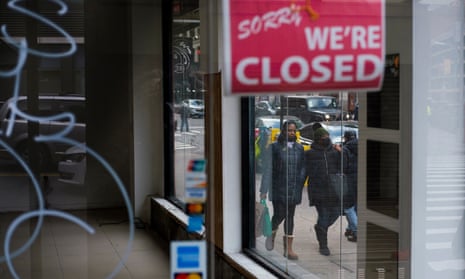The pandemic has reversed progress for working women
Women accounted for 100% of US jobs lost in December. That’s not a typo. That number is really 100%. A net 140,000 US jobs were wiped out last month: women lost a total of 156,000 jobs, while men gained 16,000 jobs according to an analysis from the National Women’s Law Center. So while there were obviously men who lost their jobs, as a group they made net gains. Women of colour have been hit the hardest: last month 9.1% of Latinas and 8.4% of Black women were unemployed, compared with 5.7% of white women and 5.8% of white men.
The United States is not the only country where women’s progress in the workforce has been drastically set back by the pandemic. An analysis by McKinsey in July 2020 found that while women make up just 39% of the global labour force, they accounted for 54% of pandemic-related job losses. Even when women have stayed in their jobs, many have had to take pay cuts or reduce their hours. Analysis of monthly wages across 28 European countries by the International Labour Organization found women on average suffered a 6.9% decline in wages because of reduced working hours, compared with a 4.7% decline in men’s wages between the first and second quarters of 2020.
The reasons why women have been disproportionately affected by the economic effects of the pandemic are fairly obvious. Jobs in female-dominated industries such as hospitality, retail and education, have been hit hardest by the coronavirus. Women also do an average of 75% of the world’s total unpaid care work, meaning they have been more likely to drop out of the workforce to take care of their family.
But just because women were more vulnerable to the economic effects of the pandemic, doesn’t mean a widening of the gender employment gap was always inevitable. Some countries have done a lot better at mitigating gender-based disparities than others. In Australia, Denmark, Norway and the United Kingdom, the share of women employed or actively looking for work has been resilient, according to recent analysis by the non-partisan Washington-based thinktank Petersen Institute for International Economics (PIIIE). In fact, the gender employment gap has closed by 0.5% in these countries.
“The better performance in these countries is not an accident,” PIIIE noted. “Each of these economies has either implemented programs to help those sectors with high female employment or helped support day care and other child services during the crisis.” Australia, for example, provided free childcare to about 1 million families between 6 April and 12 July and gave financial support to childcare facilities.
The US has thrown some money at childcare during the pandemic, and Joe Biden has promised more. But drastic changes are necessary: there was a crisis in childcare in America long before the coronavirus hit. While plenty of American politicians are very vocal about how much they care about unborn children, they seem far less concerned about the kids once they’re actually born. Guess how much money the US spends on early childhood education and care? Less than 0.5% of GDP. Meanwhile, it spends about 3.2% of GDP on the military. Lots of money for bombs, not so much money for babies.
The pandemic has made social inequality crystal clear. It’s shone a light on who is really “essential” to the economy, who keeps the world running. And it has finally turned the childcare crisis into an urgent talking point and exposed how essential childcare is to the economy. The question now is will we do what’s necessary to change things? Or will we shrug our shoulders while the workforce hemorrhages women and millions of people fall into poverty? Joe Biden is fond of saying “Show me your budget, and I’ll tell you what you value.” Now America has a chance to really change what it values.
About to give birth? Better make your husband a sandwich first
The government of Seoul, South Korea’s capital, is facing a backlash after issuing an extremely sexist online pregnancy manual. Pregnant women were advised to prepare food and clean clothes for their husbands before heading to hospital to give birth. Women were also told that hanging up smaller size clothing could motivate them to shed weight postpartum. The outcry over the guidelines has reignited a debate around the increasing number of women in South Korea who are choosing not to have kids. Weirdly, when you treat women like baby-making machines and make it hard for them to balance work and childcare motherhood becomes somewhat less attractive.
Sexual harassment claims considered more credible if made by ‘prototypical’ women
A new University of Washington-led study has found that someone making a sexual harassment allegation is more likely to be believed if they are young, conventionally attractive and feminine. AKA if they’re considered a “protoypical” woman. “When you make a perception of harassment, you also make a connection to womanhood, but the way we understand womanhood is very narrowly defined. So for anyone who falls outside of that definition, it makes it hard to make that connection to harassment,” one of the authors of the study noted.
You can stop sexual harassment with a makeup wipe!
That’s according to an extremely sexist Pad from PurCotton, a Chinese manufacturer of makeup-remover cleansing towelettes. The ad showed a woman wiping off her makeup to “scare off” a man who is stalking her at night. It’s a perfect example of the attitudes reflected in the University of Washington study.
Brexit has inspired its first erotic novel
Pounded by the Pound: Turned Gay by the Socioeconomic Implications of Britain Leaving the European Union is written by Chuck Tingle.
Betty White will spend 99th birthday feeding two ducks who visit her ‘every day’
What better way to spend a birthday?
The week in piratearchy
If you’re looking for some respite from *gestures vaguely* everything going on, can I recommend getting stuck into sea shanties? Modern renditions of the aquatic tunes have taken over TikTok and it’s really very charming.

